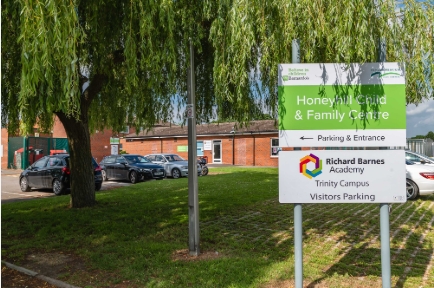Sarah Judge: ‘How I’m using my NPQH implementation model to support improvement at Richard Barnes Academy and Thomas Deacon Education Trust’


“My driver for taking on the NPQH was, firstly, self-motivation and wanting to know more myself, and then being in a position to impart that knowledge and support other people within our school and Trust. The programme provides a really comprehensive and structured approach to developing skills that are crucial for leadership. I would highly recommend it”.
Sarah Judge is Vice Principal for Quality of Education at Richard Barnes Academy where she has responsibility for the strategic leadership and management of the curriculum, teaching and learning, and outcomes at the alternative provision school. Sarah has worked in education in Peterborough for 23 years, starting as a PE teacher in the city, and immediately prior to working at Richard Barnes Academy was a senior leader in a mainstream secondary school.
In Autumn 2024, Sarah completed the 18-month NPQ in Headship (NPQH) with Cambridgeshire and Peterborough Teaching School Hub (CPTSH). Here Sarah discusses the impact of the programme on herself and Richard Barnes Academy, and how she has used the implementation model learnt during her NPQH to support embedding a pedagogical framework in Thomas Deacon Education Trust (TDET).
NPQH: “A deeper understanding of how to effectively lead”
The NPQH is designed for school leaders who are, or aspire to be, a Headteacher or Head of School with responsibility for leading a school. Designed with busy school leaders in mind, the programme is delivered using a blend of online seminars, flexible online learning and face-to-face conferences. Participants develop the knowledge, skills and concepts for areas of whole-school responsibility related to their role as an aspiring or current headteacher.
“I have always wanted to understand and learn more,” explained Sarah, when asked why she signed up to the NPQH and her original objectives. “I like to know methods behind things and things stick with me if I understand the ‘why and how’. Through the NPQH I really wanted to gain a deeper understanding of how to effectively lead, but also to explore the areas that I had not necessarily been exposed to in the positions I have held. I was very conscious that in order to be able to potentially fulfil a headship role in the future, I needed to better understand whole-school areas such as policies, governance, finance and HR.”
For Sarah, underpinned by her own “self-motivation” to learn, she experienced immediate benefits through the NPQH in terms of knowledge generation and personal development. “Personally, it has built my confidence further as a leader and equipped me with those practical tools to navigate more complex content,” she said. “I feel more prepared to make informed decisions in terms of leading with real clear vision. I have always been inquisitive, curious, and I like to sit and have that radical candour with colleagues that supports the interests of the institution and ultimately the children in the institution.”
Supporting continuous development through priority-driven implementation plans
Sarah outlined how she has applied, and shared the learning from the NPQH within Richard Barnes Academy, facilitating strategy and execution.
“The implementation unit is the one that has really had the impact to this point, obviously coupled with knowledge that I have picked up from other modules on the programme,” she revealed. “In terms of our school, we have moved to the use of implementation plans rather than school development plans. The knowledge from that sole NPQH unit on implementation has made a massive difference because not only has it helped shape the plans from the work that I want to implement, it has also allowed me to impart my knowledge and upskill other colleagues so that there is a greater structured approach to leadership across the school.
“This has helped us work far more effectively, and it has also provided clarity across the school. We operate a continuous development cycle, which replaced an annual performance management, and that just rolls and rolls. What it has allowed us to do is say ‘these are our school priorities, and these are the implementation plans that link to them’, and those plans showcase the active ingredients that we are going to be using to get there. People have been able to have those conversations with line managers to explore how they directly feed into these priorities, and influence their impact.
“So, now we have both a ‘bottom up’ and ‘top down’ approach with everybody owning some of those priorities. Staff feel they are part of those priorities and everyone sees that alignment in terms of the overall direction of travel.”
Sarah continued: “One of our priorities is on high expectations for behaviour. Our leaders of behaviour have a clear, strategic implementation plan focusing on ‘creating clear routines for young people’. Because we are working with vulnerable young people, we know that they need routines and boundaries. We know that school is their safe place, but we need to ensure their experiences throughout the school day are predictable for them because, again, that provides that safety in the school environment.
“The Trinity Campus of Richard Barnes Academy has moved massively forward on behaviour because there are really clear systems and routines that are understood by the children and the adults, and as a result, the impact is that learners are in lessons and there is less wandering around corridors. We have now got to tackle what is going on in the classroom in terms of pedagogy, and this is some of the work that I have now moved into for TDET.”
Applying implementation to new Trust pedagogy model
As Trust Lead for Pedagogy, Sarah is overseeing the implementation of a Trust pedagogy model.
“Whilst staff relationships with our young people are second-to-none, we recognised that with many of our colleagues not having QTS we needed to upskill staff around pedagogy and how we go about the delivery of lessons,” Sarah said. “At Richard Barnes Academy we created a very simplistic model around pedagogy for our staff, underpinned by Willingham’s simple model of memory, which again is shared through the NPQH. We really wanted colleagues to understand how children learn and then think about what processes happen throughout teaching in terms of being able to support that learning.
“This caught the attention of the Trust’s executive team because TDET primary schools had been previously operating a Mastery programme which had been really good for moving a number of those schools forward in terms of curriculum and pedagogy, but it had hit a ceiling where they felt that it had not evolved enough, and attainment and outcomes were stagnant. In September 2024 the primaries came out of that programme, and so there was a hole across the Trust for a teaching and learning framework.
“So, off the back of the work I had done at Richard Barnes Academy, we formed a working party with representatives from each of the schools, and with support from Henry Sauntson at Arthur Mellows Village College we subsequently created a Trust pedagogy model, underpinned by evidence, informed practice, and the cognitive science. My role now is implementing that pedagogy model in all of the schools within the Trust.”
“One of our greatest assets is our staff”
Sarah summarised the value of the NPQH to her, the difference it has made, and the practical benefits of the delivery model overseen by CPTSH.
She concluded: “I would highly recommend the NPQH to others. It provides a really comprehensive and structured approach to developing skills that are crucial for leadership. The beauty of the NPQH is that the substance is in the modules, and I can reflect back on those at any time. I had previously done the NPQSL in an older format, and the new format in the NPQH was like a breath of fresh air. It is really well balanced in terms of being able to do that qualification alongside the operational day-to-day life of being in school. And I thought that the balance was really well pitched. The seminars were really valuable, the opportunity to be able to explore practice with other people and learn from others in similar roles, including from other sectors, was really helpful. Discussing the reading in that format with colleagues was really beneficial. I was able to visit one of the facilitator’s schools and we shared resources, and as delegates we formed a good network group.”
Claire Everton, Principal at Richard Barnes Academy, added: “One of our greatest assets at Richard Barnes Academy is our staff, who go above and beyond to promote a love of learning which enhances pupils’ achievement and supports their personal, social and emotional development. Together, we ensure that every pupil has the opportunity to experience success, make progress and be “the best version of themselves’. That is why it is important to us, and TDET, to foster and encourage colleagues’ professional development, including through NPQs. RBA are clearly benefitting from Sarah’s NPQH learning.”
